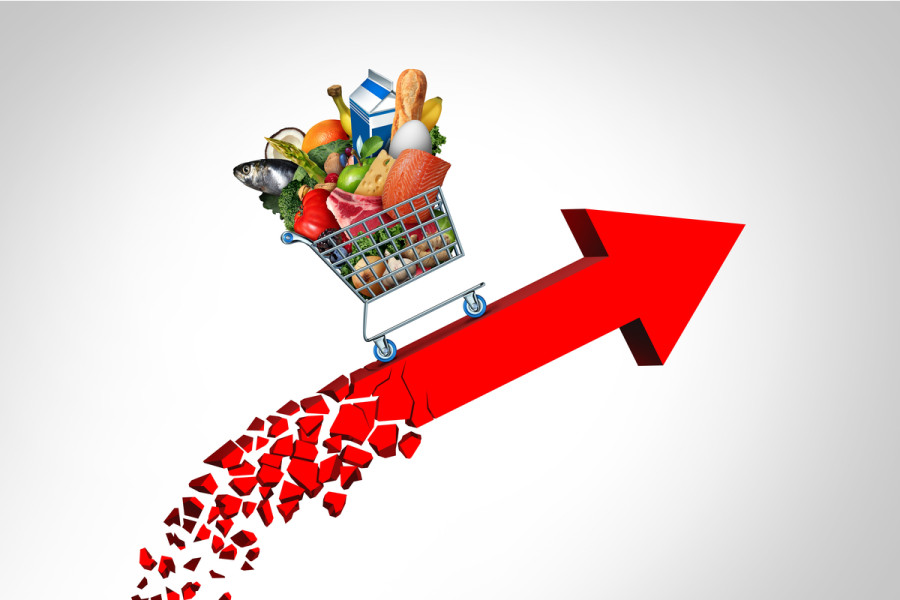Columns
Price hike, inflation and consumption
Restricting imports does not promote domestic goods nor support a free market economy.
Roshee Lamichhane
The current state of the Nepali economy appears to be in complete disarray. There are several indicators of the dwindling economy. Declining foreign currency reserves, a balance of payments deficit, low capital expenditure and declining overseas remittances are some of them. Among all these, the ballooning trade deficit which is likely to reach Rs1,700 billion by the end of the current fiscal year seems to be the most severe one. The government has taken several measures to contain the impending crisis that the economy is likely to face in the days to come. It has announced a two-day weekend policy to lessen oil consumption and banned the import of 10 types of luxury goods to reduce the trade deficit by curbing consumption.
Among the several factors that are causing the current hike in prices, the Ukraine war stands at the top of the list. It has not only led to increased food prices across the globe but also created spill over effects in the form of ever increasing prices of essential goods and services. These skyrocketing costs have eroded the purchasing power of the Nepali rupee and led to increased cost of living with consumer price inflation reaching a whopping 7.14 percent. While on the one side prices of day-to-day essentials such as vegetable oil and food items are shooting up, we also witness on the other side an utter lack of market discipline and total failure in monitoring, resulting in further price hikes. After the government placed restrictions on the import of luxury items and disallowed opening letters of credit (LC), marketers have been creating a false image of shortages in the marketplace. They have started hoarding stocks, and there has been a huge spike in the prices of essential items.
Ineffective restrictions
The advent of the information age, technology and social media have made consumers more aware about the quality of goods and allowed them to compare brands with ease. This heightened sensitisation of the buyers about marketplace dynamics has encouraged them to go for consumption of high-end branded products. Consumers who have become habituated to buying such luxury brands will continue to look for them despite a fall in their income levels in real terms. This is explained by the Deaton Paradox which suggests that sharp and small shocks to income do not seem to cause large shocks to consumption. This is an important revelation about how consumers may not always behave rationally. This has contradicted the Permanent Income Hypothesis by Milton Friedman, which suggests that people spend their incomes based on their lifetime income.
Consumers of today, who are aware about brands, quality and value for money, do not want to limit their choices. From the perspective of the rights of consumers, it is important that they are given every opportunity to choose from the list of alternative brands, both foreign and local, and make their buying decisions based on value for money. In any case, import restrictions have not been found to be effective in earlier situations of economic blockade as well. In an economy like ours where we share a 1,900-km porous border with India, any kind of import restrictions will result in black-marketing, smuggling and sale of counterfeit products. There is every possibility that such luxury items will be imported through informal channels and gain entry into the country. This will enlarge the nation’s informal economy that is already gigantic in nature, accounting for almost 70 percent of the entire economy as a few economists believe.
Curbing imports
We may not be able to compete in terms of quality, price and economies of scale with our neighbouring economies, namely India and China. Hence, import substitution through domestically made products may prove to be a Herculean task, at least in the short term. Government efforts should instead be concentrated on employing long-term strategies to substitute imports through alternative means. For now, Nepal should work on identifying goods that have a cost edge and a competitive advantage for the purpose of exporting them. On the other side, employing short-term measures to curb inflation or import restrictions can act as a band-aid approach in a piecemeal manner to reduce the mounting pressure on the already swollen trade deficit. Restricting imports may not be the solution for a free market economy like ours. In the long run, we must first identify the structural issues of our economy. Lack of productivity and lack of employment creation have always remained perennial problems in our case. To ensure the economy is healthy and robust, measures to curb imports and reduce the dependency on other nations have to be kept in place.
The government should also focus on addressing the inherent weaknesses of the economy by modernising and digitising agriculture. Statistics that are currently available show that the ratio of agriculture contribution to GDP has fallen to 23.95 percent while that of industrial production has sunk to a historical low of 5.35 percent. Restricting imports may at best act as a stop-gap arrangement since the pattern of consumption is not likely to change drastically overnight. As a long-term solution, the government should devise measures to increase exports of goods that enjoy a competitive and comparative advantage overseas. Also, consumers who are low on ethnocentrism may purchase locally produced goods if they find that such home-grown products are comparable to foreign brands in terms of quality and price. Thus, local entrepreneurs, marketers and traders should put their efforts in enhancing the quality of their products rather than trying to protect their market from the invasion of foreign brands. In a nutshell, restricting imports neither aids in boosting consumption of domestic goods nor does it support a growing free market economy like ours.




 8.75°C Kathmandu
8.75°C Kathmandu.jpg)















